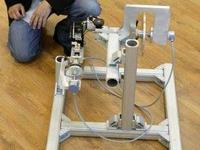| Wednesday, July 4, 2007 |
| Orbo free energy |
 A lot of people have been following these guys for a while. The most promising proposed free energy technology so far. The most likely to actually be real, that is. They have an announcement today: A lot of people have been following these guys for a while. The most promising proposed free energy technology so far. The most likely to actually be real, that is. They have an announcement today:London, 4th July 2007. Steorn, an Irish technology development company, will publicly demonstrate a real-life application of its Orbo free energy technology for the first time. The demonstration will take place in the Kinetica Museum gallery, London UK on Wednesday 4th July. People around the world will be able to watch the exhibit via a live web stream.The demonstration doesn't seem to be live yet. Thursday, they're saying now. Anybody wants to bet whether their technology will work or not? I'm betting it will. [ Technology | 2007-07-04 23:14 | 10 comments | PermaLink ] More > |
| Scrutiny of Information |
Via Frank Patrick:"If a man is offered a fact which goes against his instincts, he will scrutinize it closely, and unless the evidence is overwhelming, he will refuse to believe it. If, on the other hand, he is offered something which affords a reason for acting in accordance to his instincts, he will accept it even on the slightest evidence. The origin of myths is explained in this way."Yeah. But what is instinct? If you break it down into perceptions, most people ultimately make big decisions not based on logic, but based on that it feels right. Very often a physical feeling around your stomach area. The "gut feeling", you know. There are always more perceptions involved. Maybe it *looks* a certain way to you, in your mind's eye, and it *sounds* about right in your mind's ear. And, yes, some kind of feeling that seals the deal, that "this is right!" Most people will be likely to deny this, and will insist that they make their decisions based on a careful study and analysis of available facts, which they logically add up into a decision. Oh, nothing wrong with careful analysis and logical reasoning, but even if you're very good at that, like if you're a scientist, you end up deciding whether it is right or not, and that decision is based on some kind of feeling you have, however much you deny it. Some people merely make up the reasoning after they've had that feeling, in order to defend the "logic" of it. Others will try to go through some kind of routine before, to show that they seriously worked on the decision process. But it still ends up being some kind of feeling of it being "right" or "wrong". However, there are several kinds of what we could call instincts. In my experience, everybody has a built in sensor for their personal right or wrong, which almost instantly will give the answer, based on some kind of subconscious processing of all available facts, or based on something more esoteric, and this mechanism will tend towards never being wrong. That's what we maybe could call intuition. But at the same time, most people are easy to fool, in a long list of different ways. You can be led to believe that something is something else than what it is. You can be led to see something as normal, even though it isn't. Stage magic, hypnosis, advertising, politics - there are many places you'll find such tricks used. People will manipulate you into choosing a certain reality, because it looks, feels or sounds right, even though it isn't. I suppose that's playing into instincts too. But it isn't intuition. Recognizing the difference between those different kinds of instincts can be hard. A lot of people probably know no such difference. If it feels right, it is right, whether it is the call of your destiny, or a commercial on TV. Anyway, the question is how we maybe might train ourselves into being fooled less, by information or by perceptions. How can evidence and instinct get more into sync? I think that starts with what Alfred Korzybski called "Consciousness of Abstraction". That you're aware of the existence of the various layers and filters through which you deal with "reality", and that you have an idea of their pros and cons, strenghts and weaknesses. If you try to deny that any of those layers exist, you'll make stupid mistakes. The more conscious you are of your processes of abstracting reality into ideas, and of concretizing ideas into reality, the less likely you are to be fooled. [ Information | 2007-07-04 23:59 | 2 comments | PermaLink ] More > |